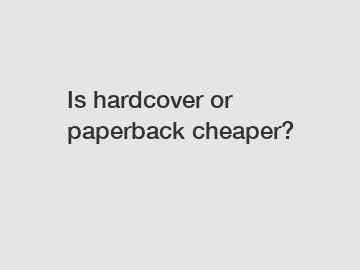Is hardcover or paperback cheaper?
Is hardcover or paperback cheaper? A comprehensive analysis.
When it comes to purchasing books, one common consideration is whether to opt for a hardcover or a paperback edition. Both have their merits and drawbacks, but cost is undoubtedly a significant factor in decision making. In this article, we will delve into the topic and explore the comparative pricing of hardcover and paperback books, taking into account various aspects that influence their costs.
Price discrepancy:

1. Hardcover books – Pros and cons:
Hardcover books tend to be pricier than their paperback counterparts due to the higher production costs associated with the durable and aesthetically appealing hardcover bindings. However, this additional expense can often be justified by the longevity and resiliency of hardcovers, making them a better option for collectors or those seeking books that will withstand multiple readings or long-term preservation.
2. Paperback books – Pros and cons:
Paperbacks, on the other hand, are usually more affordable than hardcovers. The lower production costs, attributed to their flexible paper covers, enable publishing companies to offer these editions at a reduced price. Additionally, their lightweight nature makes them convenient for travel, enabling readers to carry multiple books without significant strain. However, because paperbacks are not as durable as hardcovers, they tend to wear out faster, requiring more frequent replacements.
Factors influencing pricing:
1. Demand and Printing Volume:
The demand for a particular title greatly affects its pricing. Popular books with high demand are more likely to offer cheaper paperback options to target a wider audience. Mass market paperbacks, printed in large quantities, exemplify this approach. Conversely, limited-edition or specialized hardcovers cater to niche markets and collectors who are willing to pay a premium.
2. Production costs:
Production expenses play a crucial role in determining book prices. Hardcover books involve higher costs due to the hardcover material, additional binding elements, and often improved page quality. On the other hand, paperbacks utilize less expensive materials, such as thinner paper and less intricate binding techniques, allowing for reduced costs.
3. Release timing:
Typically, books are initially released in hardcover format, which tends to be costlier. This initial release phase targets avid readers who are willing to pay more to obtain the latest titles promptly. When the demand for hardcovers diminishes, publishers tend to release the less expensive paperback versions, making the book more affordable to a wider audience.
Considerations for consumers:
1. Budget constraints:
For readers on a tight budget, paperback books often present a more affordable option. They allow individuals to enjoy a wider range of titles without breaking the bank. Opting for paperbacks can be particularly beneficial for students or individuals who consistently read and replace books.
2. Personal preferences and usage:
Personal preferences also heavily influence the choice between hardcover and paperback. Some readers prefer the tactile feel and durability of hardcovers while acknowledging the higher price, while others prioritize cost-efficiency and portability, making paperbacks their go-to choice. Moreover, readers who enjoy annotating books or bending back pages may find paperbacks more suitable due to their flexible nature.
Conclusion:
Ultimately, whether hardcover or paperback is cheaper depends on various factors, including production costs, demand, and individual preferences. Hardcover books usually come with a higher price tag due to their robust construction and durability, making them a better investment for those seeking long-lasting copies or collectible editions. Paperbacks, on the other hand, offer affordability and convenience for budget-conscious readers, frequent travelers, or individuals who do not prioritize book longevity.
Ultimately, the decision between hardcover and paperback boils down to personal preferences, budget, and the intended usage of the book. Regardless of the choice, the joy of reading and immersing oneself in the contents of a good book remains invaluable, regardless of its cover type.
If you want to learn more, please visit our website gold foil hardcover book printing, embossed book cover printing, gold foil hardcover book printing.

Comments